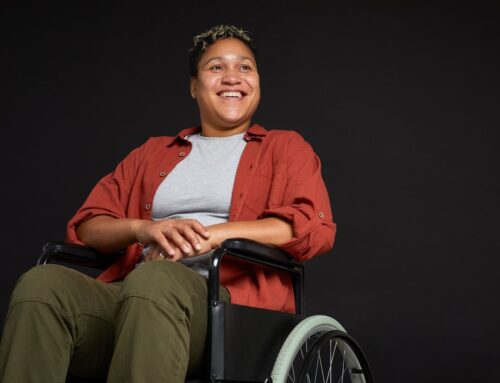
Developing an Effective Bowel Care Program for Pediatric Patients with a Disability
Children with disabilities have a much higher incidence rate of constipation than the non-disabled pediatric population. Unfortunately, bowel conditions can go unrecognized either because children are unable to express their discomfort or because other medical issues take precedence.
Implementing an effective bowel care program for children with disabilities both provides welcome relief for the child and leads to a higher quality of life, improved overall health and wellness, and greater autonomy and independence for the child and their caregiver(s).
Causes of Abnormal Bowel Movements in Children with Disabilities
Disabilities most frequently associated with bowel management concerns in children include spinal cord injury, Spina Bifida/Myelomeningocele, Cerebral Palsy, Anorectal Malformations, and Traumatic Brain Injury.
If constipation is left untreated or undertreated for an extended period of time, it can create an enlarged rectum, megarectum, and/or soiling. When this happens, patient appetite is usually reduced, but stressful or painful defecation symptoms are typically not present.
Four factors are the primary causes of abnormal bowel movements in children with disabilities, including:
- Neuromuscular
- Nutritional
- Pharmacological
- Mobility difficulties
Neuromuscular Factors
The entire nervous system needs to work together – voluntary muscle function in coordination with the rectoanal inhibitory reflex – to create a regular bowel pattern. Children whose disabilities involve neurological impairment and/or severe learning difficulties often are naturally unable to make this complex system function without assistance.
Nutritional Factors
Children with oral-motor impairment disabilities can face feeding problems that may result in a low fiber diet and inadequate fluid intake, both of which are leading factors in constipation and gastrointestinal distress.
Pharmacological Factors
Many children with disabilities take medications to help with their condition that have side effects that can impact both small and large bowel transit time.
Mobility Factors
If a child’s disability inhibits their ability to sit/squat on a toilet in the proper positioning, this can lead to difficulty passing stool and/or completely emptying the bowel.
Creating an Effective Bowel Care Program
While diagnosing constipation is relatively straightforward, the prognosis failure rate is relatively high, necessitating the need for an effective bowel care program. The first step is advising parents and/or caretakers to keep a daily chart that tracks stool frequency, consistency, diet, hydration, and/or evidence of distress during bowel movements.
Once a pattern has been established that includes an awareness of potential external contributing factors (like stress, diet, exercise, medications, and hydration), an effective bowel management program can more accurately address the problem(s).
Developing a Bowel Care Program
To develop an effective bowel care program for pediatric patients with a disability, a thorough initial medical assessment should include the following:
- history of stool frequency and consistency
- whether soiling is present
- evidence of distress associated with defecation
- medication review (including over-the-counter or prescribed laxative use)
- evidence of a dilated colon
- presence of impacted stools
- presence of an enlarged rectum
The use of an abdominal X-ray and/or an abdominal radiograph may be helpful for the assessment.
Other less common tools such as anorectal manometry and endoanal sonography, may also be useful if available.
Children with Soiling and No Enlarged Rectum
For children without an enlarged rectum or soiling, bowel management will likely involve a combination of adding fiber to their diet, ensuring the child is receiving adequate fluid intake, and stool softeners.
To achieve the best results, close follow-ups that include the use of a bowel habit diary allows physicians and caretakers to correctly assess the child’s progress and make appropriate adjustments.
Children with an Enlarged Rectum and No Soiling
Often, children with an enlarged rectum feel pain and/or discomfort during defecation. Creating a predictable bowel program can minimize distress about going to the bathroom, and a stool softener can decrease pain and discomfort when passing stool. If the patient experiences rectal overloading, the use of an enema may also be effective.
A Word About Anal Fissures
An anal fissure can cause painful defecation and may be the reason behind constipation. If this is the case, it is important to avoid stimulant laxatives and focus on the use of stool softeners, in particular those with a topical anesthetic, like Enemeez® Plus. In addition, improving perineal hygiene can help to lessen the pain of defecation.
Caretaker Involvement and Commitment
Given the frequency of misdiagnosis, caregivers are often skeptical about the need and/or effectiveness of a bowel management program. The use of illustrations, along with abdominal radiographs, may help caregivers understand the cause and extent of the problem and be more open to treatment options.
Constipation may be a relatively common problem for children with disabilities, but through the use of an effective bowel management program it is possible to help children achieve a happier and healthier life.
About DocuSol® Kids Mini-Enemas
About DocuSol® Kids and DocuSol® Kids Plus
DocuSol® Kids is a first-of-its-kind, mini enema with a non-irritating formula that functions as a stool-softening, hyperosmotic laxative by drawing water into the bowel from surrounding body tissues, replicating a normal bowel movement. This unique formulation provides children ages 2–12 fast, predictable relief of constipation within 2 – 15 minutes.
DocuSol® Kids was designed for easy use at home. The DocuSol® Kids tube is designed to offer a minimally invasive, soft, and flexible tip, avoiding any scratching or irritation to the skin. Just a 5-milliliter tube delivering 100mg of docusate sodium, the medication provides fast relief in just a few, easy steps!
About Enemeez Mini-Enemas for Children Age 12+
The Enemeez® formulation functions as a stool-softening, hyper-osmotic laxative by drawing water into the bowel from surrounding body tissues. The 283mg of docusate sodium in this mini enema product acts as a softener by preparing the stool to readily mix with watery fluids. The increased mass of stool promotes bowel evacuation by stimulating nerve endings in the bowel lining and initiating peristalsis. Not only does it soften and loosen the stool, but it initiates a normal, replicated bowel movement within 2-15 minutes.
Enemeez® Plus contains 20mg of benzocaine, assisting in the anesthetization of the rectum and lower bowel. This formulation was developed for patients who experience autonomic dysreflexia, hemorrhoids, fissures, or painful bowel movements.
Request Product Samples
Submit a form to request product samples and information on our website here.
Disclaimer: The material contained is for reference purposes only. Alliance Labs, LLC and Summit Pharmaceuticals do not assume responsibility for patient care. Consult a physician prior to use. Copyright 2020 Summit Pharmaceuticals and Alliance Labs, LLC.
Sources:
Management of Constipation in Children with Disabilities. Mamoun A Elawad MRCP; Peter B Sullivan MA MD FRCP FRCPCH, University of Oxford, Department of Paediatrics, John Radcliffe Hospital.
Bladder and Bowel Control in Children with Cerebral Palsy: Case-Control Study, Mustafa Ozturk, Faruk Oktem, Nesimi Kisioglu, Mustafa Demirci, Irfan Altuntas, Suleyman Kutluhan, Malik Dogan




![[Live Webinar] Neurogenic Bowel Dysfunction in Multiple Sclerosis](https://www.questhealthcare.net/wp-content/uploads/2025/02/325-Quest-Healthcare-Speaker-Session-1-500x383.png)


